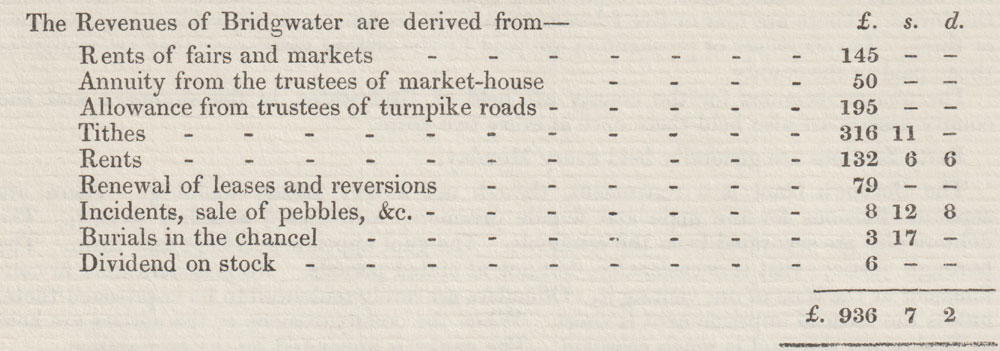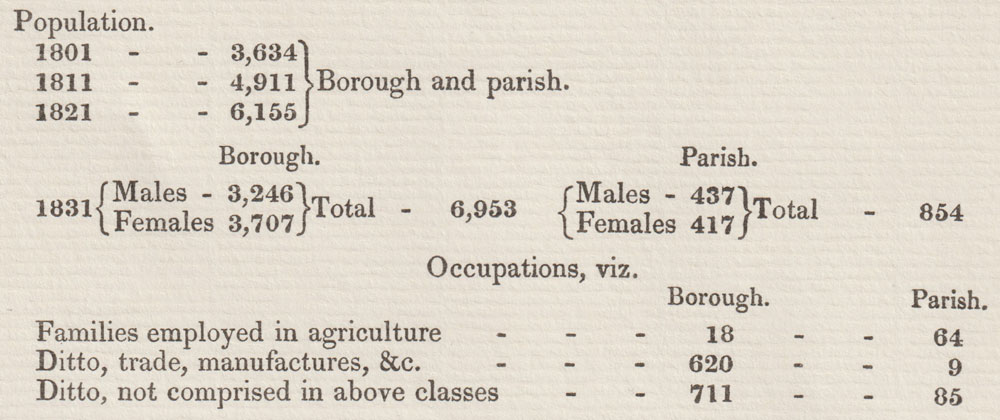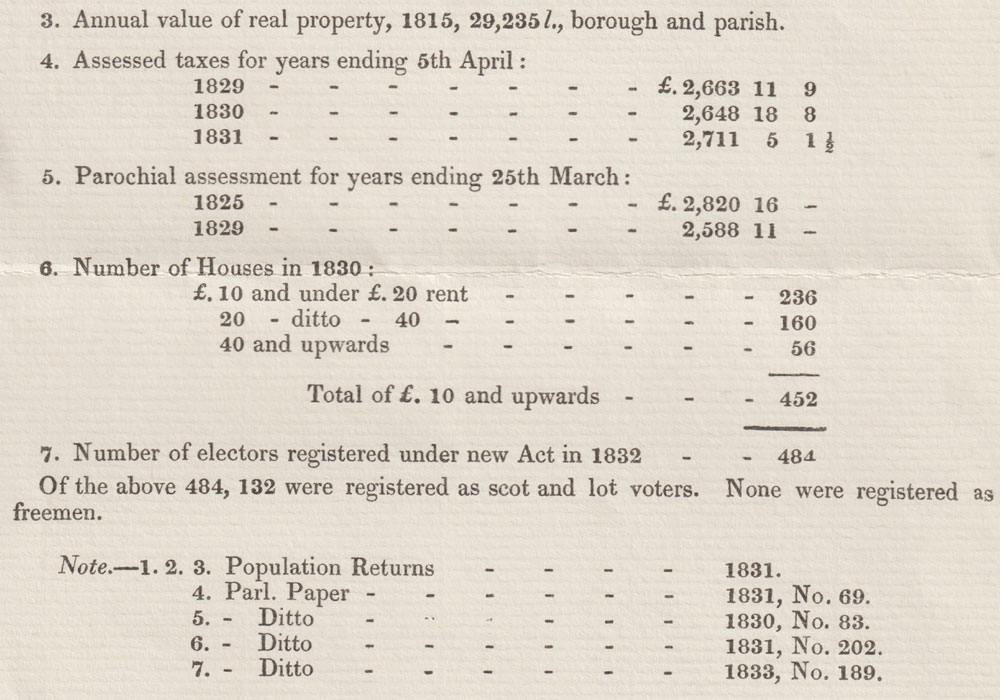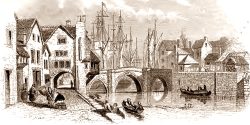The following report on the Borough of Bridgwater, essentially detailing the activities of the Town Council (the ‘corporation‘), was publishing in Reports from Commissioners on Municipal Corporations in England and Wales in 1834, pages 461 to 467. It provides an interesting snapshot into the structures and powers of the council.
REPORT ON THE BOROUGH OF BRIDGWATER
LIMITS
THE Limits of the Borough of Bridgwater for municipal purposes are co-extensive with those of the parish of Bridgwater. They are accurately marked in the map of the Boundary Commissioners. The boundaries of the borough for election purposes, which were much narrowed by a decision of the House of Commons in 1769, are by the Boundary Act rendered nearly coterminous with the limits of the municipal borough.
CHARTERS
The following Charters have been granted to the corporation :

The originals of these charters, with the exception of that of John, which is lost, are in the custody of the corporation. No one of these charters is considered the governing charter.
LEGAL STYLE
By the last charter, the corporation are called by the name of “The Mayor, Aldermen and Burgesses of the Borough of Bridgwater.”
BODIES COMPOSING THE CORPORATION AND OFFICERS
The Bodies composing the Corporation are, a mayor, two aldermen, 24 capital burgesses, (including the mayor and aldermen) and an indefinite body of free burgesses; and the Officers are, a recorder, a town clerk, a receiver, two serjeants-at-mace and constables.
COMMON COUNCIL
The capital burgesses form the Common Council of the borough.
APPOINTMENT OF OFFICERS
The charter of Charles 2. provides, that whenever it shall happen that any one or more, the mayor, recorder, aldermen, capital burgesses, bailiffs, receiver or common clerk, or any other inferior officer of the borough aforesaid for the time being, shall die, or be removed from their offices for a reasonable cause, that then another fit person or other fit persons shall respectively be chosen in due manner as in the borough aforesaid in that behalf late by the space of seven years now has been used.
MAYOR
The Mayor is chosen annually by the capital burgesses, or the major part of them, out of their own body, and he continues during office to be a member of the common council. He is a justice of the peace and coroner of the borough. Formerly he received an allowance of £60 or £70 a year, but this was discontinued 20 years ago. His fees as coroner are given to the town clerk. About five years since, the Rev. William Allen, a member of the common council, having been elected mayor, resigned his office in consequence of the bishop of the diocese expressing a wish that he should not act as mayor. The present mayor is Robert Anstice, esq., attorney, resident at Bridgwater.
ALDERMEN
The Aldermen, two in number, are chosen for life, by the common council, or the major part of them, from their own body, being inhabitants; after their election they continue to form part of the common-council. They are justices of the peace of the borough, and preside with the mayor in the civil court or court of record, and at the quarter sessions. They have no peculiar privileges or emoluments. The present aldermen are, Robert Anstice, Bridgwater and Jacob Watson, Ditto.
CAPITAL BURGESSES
The Capital Burgesses, called the common council, are 24 in number. They are chosen out of the resident free burgesses by their own body, and hold their office for life. After their appointment they frequently cease to reside. At present three of the common council are non-residents, but occasionally attend the meetings of the council. There are some dissenters in the council. It is the practice to select the new capital burgesses out of the families of the different members of the council; 18 members of the present council have been chosen from eight families.
FREE BURGESSES
The functions of the common council are to elect the mayor, aldermen and recorder, and to fill up vacancies in their own body. They also appoint the other officers of the corporation above enumerated. They are the governing body, having the general superintendence of the affairs of the corporation and the sole management of its revenues. The mayor forms one of the common council, and without his presence no meeting can be held, unless in the case of his death, when the senior alderman presides. The freemen or commonalty of the borough, called Free Burgesses, are created, 1st, by birth; viz. the eldest son of a free burgess, born within the borough. 2nd. By apprenticeship within the borough to a free burgess for seven years. 3rd. By gift of the common council, who create as many burgesses at they please. The candidates at elections for Members of Parliament are usually made free burgesses. The number of honorary freemen at present is nine. The number of other free burgesses is only three. The free burgesses have no particular privileges or emoluments, but claim to be free from port dues in all ports except London and Bristol.
FEES
A person entitled by birth or servitude to his freedom pays a Fee of one guinea to the town clerk, on admission, and the corporation receive 10 guineas on the admission of a person to the freedom of the borough who is not entitled by birth or servitude.
RECORDER
The Recorder is appointed, during good behaviour, by the mayor, aldermen and common council, or the greater part of them. He is required by the charter to be “learned in the laws of England”; in general, however, a country gentlemen residing in the neighbourhood has been appointed to this office. In case of sickness or necessary absence, he may appoint a deputy, who is not required by charter to be “learned in the laws”; but who is usually an attorney. Neither the recorder nor his deputy receives a salary. Till lately, he attended personally at the quarter sessions, and now appears there by his deputy. Both the recorder and his deputy are justices of the borough.
TOWN CLERK
The Town Clerk is called in the charter of Charles 2, “Common Clerk, Prothonotary and Clerk of the Peace of the Borough.” He acts as clerk to the magistrates and solicitor to the corporation. His appointment is during good behaviour, and is made by the common council, or the major part of them. He has the power of appointing a deputy. He receives no salary. It was stated to us by the late town clerk to be an office of no emolument, but it appeared that he had in some years paid his predecessor an annuity of £50. He receives fees on the preparation of the corporation leases, on the admission of freemen, and also the coroner’s fees.
JUSTICES OF THE PEACE
The mayor and recorder, or his deputy, and the two aldermen, are Justices of the Peace for the borough.
CIVIL COURT
There is a Civil Court or Court of Record held every Monday in every week before the mayor, recorder and aldermen for the time being, or any three, two or one of them. The mayor, when present, acts as the presiding judge. The jurisdiction of the court extends to all personal actions, and to any amount. There are few removals into the superior courts. The officers of the court are the town clerk, who acts as prothonotary, the two bailiffs, the two serjeants-at-mace and the crier. The office of prothonotary resembles that of the prothonotary of the Common Pleas at Westminster; he files the proceedings and taxes the costs. The bailiffs perform the duties of the sheriffs; they have the care of the prison, and all precepts, writs, &c. are directed to and returned by them. They receive no fees. They are liable, like the sheriff, for any default in the execution of process, but the corporation consider themselves bound to save them harmless. The serjeants-at-mace are directed by the charter of Elizabeth to be the attornies of the court, and to serve the mayor, recorder and aldermen as often as their presence or service shall be required. In practice, however, any attorney of the superior courts at Westminster is permitted to use the name of one of the serjeants, and to practise in the court. The duty of the serjeants-at-mace also is to serve the process of the court. They receive no fees. The crier of the court receives a salary. The juries are summoned by the bailiffs; in general 42 of the names are taken from the grand jury panel of the sessions, and these persons are summoned as the jury of the court of record. They are usually taken from the more respectable class of tradesmen. The practice of the court is assimilated to that of the Court of Common Pleas at Westminster. There are a few old rules in writing, and in 1827 and 1832 several new rules were made in conformity with those promulgated by the superior courts. The court sits from Monday to Monday, and each step in a cause is taken on the succeeding court day. Where a cause goes to trial, judgment and execution may be obtained in seven weeks ; where the defendant suffers judgment to go by default, in four weeks. The costs are very heavy; those of a bailable writ amount to £2. 2s. 4d., and of a serviceable writ to £1. 6s. 6d. The costs of a bailable action which goes to trial amount to about £21, of which sum between £5 and £6 are paid as prothonotary’s fees. The costs of a judgment by default are from £7 to £8. The costs of the defendant in a cause which goes to trial amount to about £4. Actions brought in this court seldom come to trial, not more than one or two being tried in the course of a year. Within the last 12 months 14 actions have been commenced. Cases are usually compromised upon the writ being issued.
It has not been an unusual practice for the town clerk, although he acts as an officer of the court, to practise there in the name of some other attorney; and when the town clerk and his son were in partnership, it appeared that the writs had been issued in the name of tHe son on the partnership account. We did not find that in the instances proved before us the practice had been abused for any improper purpose, but it is obvious that the union of the two characters is highly objectionable.
COURT OF QUARTER SESSIONS
The Court of Quarter Sessions is held before the mayor, recorder and aldermen, or any three of them, of whom the mayor and recorder, or mayor and deputy recorder, are directed by charter to be two. They have jurisdiction over the borough and parish by the charter of Charles 2. Under the charter of Elizabeth they had no power to try felonies, but by that of Charles 1, they are enabled to inquire “of all manner of felonies, trespasses, evil doings, and all other faults and articles whatever within the borough and parish, liberties or precincts thereof, made, moved or committed, or there to be done, moved or committed, which before the keepers and justices of the peace which within any county of the realm of England, by the laws and statutes of the realm, ought or may be inquired of; yet so that to murder or felony (petty larceny only excepted), or to any other matter touching the loss of life or or member, within the borough, without the special warrant of the King, by any means there-after they do proceed.” Under this clause the court still considers itself bound not to award a higher sentence than seven years’ transportation. The grand and petty juries are thus chosen the town clerk, acting for the bailiffs, makes out a list of all the rated inhabitants of the borough; from this list 24 grand and 24 petty jurymen are selected every sessions. As persons die, or new inhabitants come into the borough, the lists are from time to time altered. The precepts for summoning the juries are made out in the clerk’s office and are delivered to the bailiff’s, who return them. No partiality appears to have been exercised in summoning the juries. There are four or five felonies tried each sessions, and very seldom less than two or three. The expenses of prosecution are paid by the county treasurer; they are similar to those paid in the county. The quarter sessions for the county are held at Bridgwater, in the summer; and the county assizes are also held there once in every two years. Petty Sessions are generally held every Monday.
GAOL
The Borough Gaol is a convenient, though not a very strong building. There are separate divisions for the male and female prisoners, with a yard attached to each. The debtors also are separated from the criminals. The gaol appears well kept and clean. The borough justices visit it occasionally, but not at stated periods. No prisoners were in confinement at the time of our visiting it. Offenders are rarely sentenced to be imprisoned there, unless the term of imprisonment is short. When the county sessions or the assizes are held at Bridgwater the gaol is much crowded. The gaoler is appointed by the corporation.
POLICE
The Police of the town is under the management of the borough magistrates. The mayor and one or two of the aldermen meet at the town-hall every Monday for police matters. The recorder also frequently attends these sittings. There are 34 constables, appointed by the common council annually; upon a vacancy occurring during the year, it is filled up by the magistrates. The watching of the town is provided for by the local Act, 7 Geo 4, (1826). The number of watchmen appointed is very inadequate; they are only four in number, and being ill paid, they watch only a few hours. Complaints have been made by the inhabitants of the insufficiency of the watch.
There are two local Acts relating to the borough of Bridgwater. The 3 Geo. 4, (1822,) repeals and re-enacts and consolidates certain Acts respecting the repair of the roads leading to Bridgwater; the 7 Geo. 4, (1826,) is an Act for enlarging the market-house and regulating the market within the borough of Bridgwater, and cleansing, lighting and watching the streets, lanes and other public passages and places within the said borough and adjacent thereto, and for the improvement thereof. By this Act 24 trustees are appointed, who have power to make bye-laws, to employ watchmen and to light the streets with gas; they have also various powers given them as to the regulation of the market. The rate authorized to be levied is upon the tenants of houses, gardens, yards, &c., and is not to exceed 1s. in the pound upon the annual value of the property, according to the poor-rate. This rate is for the purpose of paving, cleansing, lighting and watching. The present rate is 1s. in the pound. The corporation are empowered annually to pay out of the bridge-tolls to the trustees the sum of £100. towards lighting the bridge and quays, &c.
The power of lighting the town with gas has never been acted upon, and both the lighting and watching are insufficient.
APPOINTMENT OF OVERSEERS AND WAYWARDENS
A list of persons qualified to serve both as Overseers and Waywardens is presented by the vestry and the outgoing overseers for the sanction of the magistrates of the borough, who have the right to select such officers. Much irritation has been occasioned in the town by the refusal of the magistrates to appoint the officers chosen by the parishioners. The exercise of this power is described as being exceedingly injurious to the interests of the inhabitants. In the month of September 1831, two waywardens were appointed, whose names did not appear in the list of 10 persons returned by the vote of parishioners in public vestry, in pursuance of the then general Highway Act. It appears from the year 1820 to the year 1828 the appointments of overseers were made by the justices from persons of all political parties. During that period there was a compromise between the political parties in the borough of Bridgwater, each party returning a member; but, in the language of a witness, “in the year 1833 the borough was contested by two Reformers and a Tory, and in the following year four Tory overseers were appointed. In the year 1833, the parishioners recommended to the justices two overseers of each party, but the justices rejected the two Reformers and appointed two Tories; though one of the, persons rejected was the largest rate-payer in the borough, and the other the keeper of the largest shop in the town, a person of high character and of wealth, and who has been 25 years in business in the borough.” This practice is described as leading to partiality in dealing on the part of the parish officers with men of a particular party in politics, as preventing an efficient control over the rates raised for the poor, and as also preventing the rate-payers from choosing those persons whom they would desire to be entrusted with parochial affairs. It appears that in the year 1828, in consequence of certain disputes respecting charges, a resolution was passed and entered in the vestry-book, that the town clerk should no longer be employed as solicitor to the parish ; but as the justices choose the overseers, the latter have thought proper to disregard the vote of the vestry, and continue to employ the town clerk as the parish solicitor.
BYE-LAWS
By the charter of Elizabeth, power is given to the mayor, aldermen and common council of the borough, or the major part of them, to make Bye-laws, and to enforce the observation of them by fine and imprisonment. The common council now exercise this right, but the bye-laws are made in the name of the mayor, aldermen and burgesses. There are many ancient bye-laws, none of which are now acted upon; but soon after the passing of the Pilot Act, (6 Geo. 4, c. 125,) the common council promulgated a body of bye-laws, “for the better regulation of pilots and the safety of ships and vessels resorting to the port of Bridgwater.” A table of the rates of pilotage is appended to these laws, which are printed.
REVENUES

The above amounts are the average receipts under each of the heads of revenue for three years, except the fines on renewal of leases, which are calculated on an average of seven years.
EXPENDITURE
The Expenditure is composed of the following items, which are also calculated on an averao., of three years. The payment on account of tithe in the year 1832, £629. 11s., very much exceeds the average expenditure; the payment on the same account in 1830 was £173. 9s. 11d., and in 1831, £172. 14s. 1d.

The tolls of the fairs and markets are let by the corporation from year to year. The annuity from the trustees of the market is paid under a clause in the Act for building the market before referred to. The allowance from the trustees of the turnpike roads is also paid in consequence of a clause in the Act for paving the town. The tithes were acquired by purchase, subject to certain payments and to the repairs of the church of Bridgwater. The great tithes are let from year to year; and for small tithes the corporation charge residents 6d., non-residents 1 s. per acre. The rents are derived from houses and lands, which are let generally on leases for 99 years, determinable on three lives. The property is valued before it is let, and it appears to be well managed. When a life drops in a lease, the tenant of the property has always the offer of the renewal, at a price fixed by the corporation, and when property falls into hand it is let by auction. The corporation charge a fee of two guineas for burial in the chancel, and £10. 10s. when new ground is opened.
DEBT
The Debt of the corporation amounts to £2,823 8s. 7d. For several years it has been in a course of reduction; 20 years ago it amounted to £4,000. A considerable portion of it was occasioned by the defalcation of the receiver, who, for a series of years, received the revenues of the corporation, and paid but few of the claims on the corporate body. He was a member of the corporation. The corporation having neglected to fill up the vacancies in their body, a mandamus was obtained to compel them to do so. The result of this proceeding was, to place the affairs of the corporation in more competent hands. The receiver was called upon to deliver his books and accounts; he refused to do so, and a mandamus was applied for, to compel the delivery. The books were delivered, but no money was received. The accounts were in so imperfect a state, that neither receipts nor payments could be accurately ascertained, and the amount of the balance due to the corporation could not be exactly stated, but it formed a principal part of the debt. After the detection of the defalcation of the receiver, no steps were taken to remove him from the corporation, and he remained a member of that body until he died. “The remainder of the debt was incurred fully half a century ago; why or for what purpose was not known.” After the proceedings in the Court of King’s Bench had given the management of the corporate affairs to other persons, it was determined to pay off the debt, and the mayor, the bailiffs and the receiver relinquished their salaries. In the year 1818, about £2,000 were borrowed on mortgage of the tithes, and expended in the general purposes of the corporation.
ACCOUNTS
From what has been before stated, it will be seen that the accounts of the corporation were formerly kept in a most unsatisfactory manner. Of late years they are carefully entered, and regularly audited.
STATE AND PROSPECTS
The town of Bridgwater is in a prosperous state, the trade is improving, and considerable facilities have been afforded by the erection of the new markets for the accommodation of the inhabitants.

Bridgwater is a warehousing port.
STATISTICAL DETAILS


REMARKS
Much complaint against the corporation was made before us, both as regards the interference of those members of the body who are magistrates with the choice of overseers, and also with regard to the conduct of the mayor and other officers at elections; but the substantial ground of the complaint was against the manner in which the corporation are elected, and the secrecy of their proceedings. As far as we could discover, the corporation appear of late years to have fairly performed their duty as to the public property, though they may not, and we believe do not, fairly represent the opinions of those over whom they preside. Previously to the passing of the Reform Bill, a considerable share of patronage was distributed among the members of the corporation and their connections, but it does not appear that the corporation as a body ever interfered either to obtain or to distribute such patronage.
London, April 1834. Henry Roscoe and Edward Rushton.
Documents accompanying this Report:
- Copies of the Translations of the Charters of 29 Eliz., 4 Car. 1, and 35 Car. 2.
- Copy of the Bye-Laws for the Regulation of Pilots.
